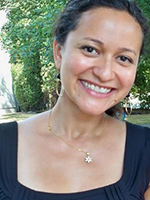Dr. Angela Kaida
Inspired by Activism
Assistant Professor and Canada Research Chair at Simon Fraser University, British Columbia
 Dr. Angela Kaida, Assistant Professor and Canada Research Chair at Simon Fraser University, was influenced early on to pursue a career in HIV research. Born in Kenya with family connections across East Africa, she saw the impact that HIV could have on the lives of those living with HIV and those around them. "In my family, I saw some of the ways in which HIV-related stigma played out—fear of accessing care, and of disclosing one's status," explains Dr. Kaida. "I was really confused that an infectious agent could yield this sort of shame within a very loving and tight family." Set on the path of HIV research, she worked in lab sciences but was swayed into epidemiology and public health by the big questions. "I got thinking about larger social and structural environments and it really pushed me towards the public health framework," says Dr. Kaida. "If we have shame and stigma and discrimination at such a high level, we're not going to get people to come forward for testing, or to initiate treatment and disclose status."
Dr. Angela Kaida, Assistant Professor and Canada Research Chair at Simon Fraser University, was influenced early on to pursue a career in HIV research. Born in Kenya with family connections across East Africa, she saw the impact that HIV could have on the lives of those living with HIV and those around them. "In my family, I saw some of the ways in which HIV-related stigma played out—fear of accessing care, and of disclosing one's status," explains Dr. Kaida. "I was really confused that an infectious agent could yield this sort of shame within a very loving and tight family." Set on the path of HIV research, she worked in lab sciences but was swayed into epidemiology and public health by the big questions. "I got thinking about larger social and structural environments and it really pushed me towards the public health framework," says Dr. Kaida. "If we have shame and stigma and discrimination at such a high level, we're not going to get people to come forward for testing, or to initiate treatment and disclose status."
Dr. Kaida now pursues those big questions in her current research. She is one of the co-Principal Investigators and the British Columbia lead of CHIWOS, the Canadian HIV Women's Sexual and Reproductive Health Cohort Study. The research objective of CHIWOS is to measure access to women-centred care for women living with HIV and to look at how that access influences their health outcomes, including sexual, reproductive and mental health. The study is community-based, involving women living with HIV, program and policy people, front-line service workers, researchers, and clinicians in all stages of the research process. "We now have a national team of peer research associates (or PRAs) who have received training in research and who are mentors to others," says Dr. Kaida. "And having the opportunity to work with people right from the beginning is allowing us so many opportunities to get research findings into the hands and minds of people who can change the service and policy environment." For Dr. Kaida, CHIWOS is laying the groundwork for community-based research in the field. "Before we launched the national survey part of the study, we conducted several focus groups with women living with HIV to really explore women's definition of women-centred care and the structural, social and spatial barriers to receiving care," explains Dr. Kaida. "It's been really fascinating qualitative work that has supported the development of the quantitative part of the study." The project, funded by CIHR, OHTN and the CIHR Canadian HIV Trials Network, continues to actively recruit participants throughout British Columbia, Ontario and Quebec.
The foundations laid down in CHIWOS are spilling over into Dr. Kaida's research project in Soweto, South Africa as well. Supported by the CIHR, the AyaZazi study looks at intersecting biomedical, socio-behavioural, and structural factors that influence HIV acquisition risk among young people. Meaningful involvement of youth at risk of acquiring HIV is critical to the project's foundations and success. "It's about not assuming that researchers and policy makers have all the answers, and respecting the lived experience of kids in Soweto. What are they saying in terms of their priorities to minimize and understand HIV risk and avoid infection?" Dr. Kaida explains. "We are hiring several young people in Soweto to be a part of our research and to help develop tools and processes that are more meaningful and accurate of their experiences and priorities."
The resiliency and tenacity of the HIV community as a whole continues to drive Dr. Kaida in her research. "In HIV research, I think there is a general feeling of passion and commitment to social justice. The work of the early activists, researchers, clinicians, scientists and policy makers in the field has been transformative on a global scale—changing how we think about research, community, and human rights," says Dr. Kaida. "There is a relentless push in the community for social change, for justice, and for scientific discovery, and I'm very inspired by the progress that the field has made in the last 30-plus years. The rest of us are trying to create work that contributes to this amazing field of passionate people who want change."
The Canadian Association for HIV Research (CAHR), the CIHR HIV/AIDS Research Initiative, the Canadian Foundation for AIDS Research (CANFAR), the CIHR Canadian HIV Trials Network (CTN) and the Canadian HIV Vaccine Initiative (CHVI) Research and Development Alliance Coordinating Office (ACO) would like to thank Dr. Kaida for her significant contributions to our understanding of HIV. Her work is part of a larger Canadian effort that is making a difference in the lives of those affected by HIV in Canada and around the world.
- Date modified: